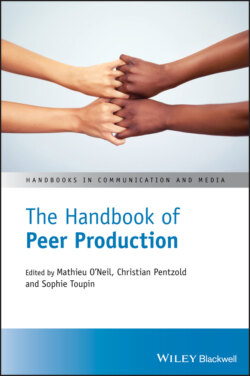Читать книгу The Handbook of Peer Production - Группа авторов - Страница 11
Preface
ОглавлениеThe Handbook of Peer Production has emerged from a community of researchers, practitioners, and activists who share a belief in the virtue of open collaboration. We are grateful for this community’s existence and hope we have been equal to the task of documenting its work. Academic books are always collective endeavors; we are immensely thankful to those who have helped us in bringing this project forward.
The Handbook chapters were peer reviewed by the three editors. In addition, Chapter 1 (“The Duality of Peer Production”), Chapter 29 (“What’s Next?”), and Chapter 30 (“Be Your Own Peer!”) which we co‐wrote, were reviewed by Sébastien Broca. His insightful comments played a substantial part in making our arguments more coherent, so we express our heartfelt thanks for his contribution.
Our congratulations to all the authors who worked hard to follow our timeline and recommendations for a job well done – especially those who came to the project late as others had to drop out. We are also grateful that Yochai Benkler and Helen Nissenbaum allowed us to reprint their article “Commons‐Based Peer Production and Virtue.” Thanks to Nils Borchers, George Dafermos, Chris Giotitsas, Vasilis Kostakis, Arwid Lund, and Denise Thwaites for their help during the course of the project.
At Wiley, our thanks go to Haze Humbert who encouraged us to embark on this three‐year endeavor, to Kartiga Ramalingam and Janani Govindankutty who helped us navigate legal issues, as well as to Kelley Baylis, Todd Green, Skyler Van Valkenburgh, and Andrew Minton who supported the volume through various stages of production. Finally, our thanks to Rosemary Morlin for copy‐editing and to Aijth Kumar for putting together the volume’s index.
Mathieu would like to thank Stefan Merten and the Rosa Luxemburg Foundation for flying him to the United Kingdom from Australia to attend the 4th Oekonux conference in Manchester back in the day. In Manchester I met for the first time Michel Bauwens, George Dafermos, Johan Söderberg, Athina Karatzogianni, Stefan Merten, and many other researchers and activists. The conference was so much fun and so inspiring that during the closing plenary session I proposed setting up a journal, which eventually became the Journal of Peer Production. On the way to Manchester from London I had made a stop at the Oxford Internet Institute to attend a workshop on online governance organized by two (at the time) emerging researchers: Malte Ziewitz and Christian Pentzold. Years later, Christian and I sometimes bumped into each other at academic conferences and after I suggested we collaborate, he came up with the idea for this Handbook. Sophie Toupin, who by then had joined the Journal of Peer Production editorial team, had complementary research interests and she proved the perfect choice to join us. Working with Christian and Sophie on this labor of love has been a wonderful and enriching experience.
Thanks to my colleagues at the University of Canberra’s News and Media Research Centre for their unwavering support and sound advice. Thanks also to my research associate Xiaolan Cai as well as to my research partner Rob Ackland at the Australian National University’s Virtual Observatory for the Study of Online Networks for helping us map the online network of peer production actors. Thanks to the Australian National University’s School of Sociology for its continuing support. I am grateful to the University of Canberra’s Faculty of Arts and Design for supporting my Outside Studies Program in 2019, which enabled me to focus on this project and to work with colleagues overseas: George Dafermos (Integral Cooperative, Heraklion), Laure Muselli (Télécom Paris), Giacomo Poderi (IT University of Copenhagen), and last but not least Mélanie Dulong de Rosnay and Francesca Musiani (Centre Internet et Société, CNRS). My parents Mike and Charmian kindly hosted during my time in Paris. At the time of writing (April 2020) my father is fighting Covid‐19. My parents’ politics and humor inspired me. I dedicate this Handbook to them.
Christian would like to thank his colleagues at Bremen and later at Chemnitz University. Both places provided the intellectual environment and academic workplace necessary to pursue such long‐term project. I owe special thanks to my student assistants Lea Neubauer who helped us with the transcriptions of the interviews and Jessica Giesa who compiled the lists of tables and illustrations. Editing this volume and collaborating with Mathieu and Sophie has been an inspiring learning process and I thank them for their dedication, inquisitiveness, and their eye for all the many details that were necessary to make this book happen.
Sophie would like to thank the professors and graduate students in the Communication Studies Department at McGill University who have continued to give her invaluable advice, intellectual support, and community. Joining Mathieu and Christian in editing this Handbook at the beginning of my PhD was at first daunting, but it has proven to be very rewarding. Now that these two long‐term projects are coming to an end – the PhD and the volume – I remain inspired by the many collectives and groups who use the practice of peer production to reimagine the world they want to live in. I dedicate this Handbook to them. Finally, heartfelt thanks to Christian and Mathieu; it has been a delight working with you!
